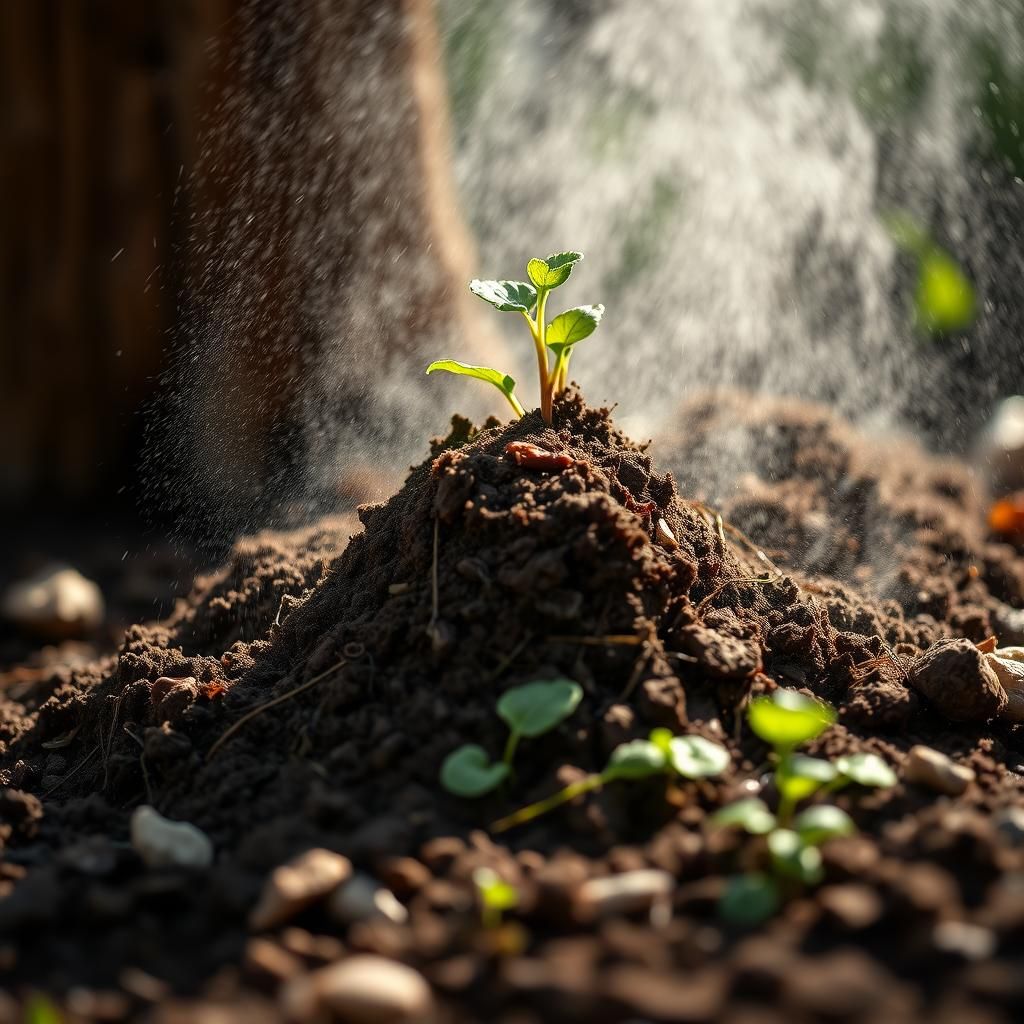How Often Should I Pee on Compost? A Guide to Effective Composting

Composting is an environmentally friendly way to recycle organic waste, but it can sometimes be confusing. One common question that arises among compost enthusiasts is, How often should I pee on compost? Urine, rich in nitrogen and nutrients, can enhance the composting process, but using it effectively requires some knowledge. In this guide, we will explore the benefits of adding urine to your compost pile, the ideal frequency for application, and tips for maintaining a balanced composting ecosystem. By understanding the role of urine in composting, you can create nutrient-rich organic matter that benefits your garden and the environment.
How Often Should I Pee on Compost?
Peeing on compost can be a beneficial practice for enriching the compost with nitrogen, which is an essential component of healthy soil. Ideally, you should aim to add urine to your compost every few weeks, depending on the size of your pile and its moisture levels. A good rule of thumb is to apply diluted urine (one part urine to ten parts water) to keep the compost adequately moist and to avoid any unpleasant odors. Monitor the temperature and smell of your compost; if it gets too hot or starts to smell offensive, it may indicate that you are adding too much urine too quickly.
Benefits of Using Urine in Compost
Using urine in compost adds a rich source of nitrogen, which is essential for microbial activity and accelerates the decomposition process. Additionally, urine contains trace elements and minerals that contribute to soil fertility and plant health. This natural fertilizer can enhance the overall nutrient content of your compost, leading to a more robust and nutritious final product.
How to Collect Urine for Composting
Collecting urine for composting is straightforward and involves using a clean container specifically designated for this purpose. It’s crucial to ensure that the container is free of any chemicals or contaminants. You can store the urine for up to a week, but longer storage may lead to additional ammonia buildup. To minimize odors, keep the collection container sealed and in a cool place before use.
Dilution Ratios for Composting
To effectively use urine in your compost pile, it's essential to dilute it properly. A commonly recommended ratio is one part urine to ten parts water. This dilution helps distribute the nutrients evenly without overwhelming the compost with nitrogen, which can lead to odor problems or nutrient imbalance. Always evaluate the moisture level in your compost after applying urine to ensure it remains at an optimal consistency.
See also:
Frequency of Application
The frequency at which you should apply urine to your compost depends on several factors, including the size of your compost pile and the environmental conditions. Generally, applying urine every two to four weeks is advisable. However, if your compost shows signs of being too dry or lacking in activators, you may consider adding it more frequently, while also ensuring to monitor the pile's overall health.
Signs of Over Application
Over-Application of urine can lead to undesirable consequences such as an excessively warm compost pile or a strong ammonia odor. If you notice that the compost is steaming excessively or has started to smell foul, it’s a sign that you've added too much urine too quickly. In such cases, balance it out by adding more browns (carbon-rich materials) to help absorb the excess moisture and nutrients, ensuring the compost remains healthy.
| Aspect | Recommendation |
|---|---|
| Collection | Use a clean, dedicated container. |
| Dilution | 1 part urine to 10 parts water. |
| Frequency | Every 2-4 weeks. |
| Signs of Over-Application | Strong ammonia odor or excessive heat. |
| Balance | Add browns if too wet. |
The Importance of Nitrogen Balance in Composting with Urine
Utilizing human urine in composting can significantly enhance the nitrogen content, which is a critical component for effective compost breakdown. The frequency of adding urine to your compost pile should ideally reflect the current nitrogen levels; if the compost appears dry or lacks heat, it may indicate a deficiency. Adding urine not only rectifies this deficiency but also aids in maintaining the right moisture balance and stimulates microbial activity. However, it’s essential to monitor the ratios of carbon and nitrogen to prevent overwhelming the compost environment, ensuring that the composting process remains efficient and effective.
What is the Ideal Ratio of Carbon to Nitrogen?
In composting, achieving the ideal ratio of carbon to nitrogen (C:N) is crucial for optimal decomposition. Generally, a C:N ratio of about 30:1 is recommended, meaning there should be approximately 30 parts carbon for every 1 part nitrogen. Human urine, being rich in nitrogen, can help adjust the balance if the compost feels too carbon-heavy. By adding urine appropriately, you not only enrich the compost but also fuel the activity of decomposing organisms, leading to healthier compost.
How Does Urine Enhance Microbial Activity?
Urine is packed with beneficial nutrients such as nitrogen, phosphorus, and potassium, which serve as food for microorganisms in the compost. When added correctly, it can create a rich environment that encourages microbial growth, enhancing the overall breakdown of organic matter. The presence of these nutrients boosts both the bacterial and fungal populations, essential for breaking down materials effectively, thereby speeding up the composting process and improving the quality of the final product.
See also:
What Are the Guidelines for Adding Urine?
When incorporating urine into compost, it's important to follow certain guidelines to maintain balance and prevent odor issues. Ideally, urine should be diluted with water—usually in a 1:10 ratio—to prevent it from becoming too concentrated and potentially harming the composting organisms. Adding urine in small, measured amounts regularly helps avoid spikes in nitrogen levels, ensuring a gradual enhancement of the compost without overwhelming the natural balance of materials present.
Can You Overdo Urine in Composting?
Yes, over-applying urine can lead to several issues in the composting process. An excessive nitrogen supply can produce an unpleasant odor and may result in a compost pile that is too wet, leading to anaerobic conditions. Such conditions hinder the activity of beneficial microorganisms needed for efficient composting. It’s crucial to maintain moderation and vigilance when adding urine to your compost heap, adjusting other materials as necessary to achieve that optimal balance.
How Often Should You Monitor Your Compost?
Regularly monitoring your compost is essential in determining when and how often to add urine effectively. A weekly check can help assess moisture levels, temperature, and overall composition. If your compost appears dry or lacks heat—signs of insufficient nitrogen—you may need to add urine more frequently. Conversely, if the compost is too soggy or has a strong odor, it might need a break from any additional nitrogen input. Establishing a routine can help ensure a healthy, balanced compost environment.
Questions from Our Readers
How often should I add urine to my compost?
Adding urine to your compost can be done as often as every few weeks. The frequency depends on the size of your compost pile and the amount of nitrogen it needs. Generally, a balanced approach is key, so ensure you are also incorporating other brown materials like leaves to maintain optimal conditions.
Can I pee directly on my compost?
Yes, you can pee directly onto your compost pile, but it's advisable to dilute it with water first. This helps to distribute the nutrients more evenly and prevents the compost from becoming too acidic. A good ratio is about one part urine to ten parts water.
See also:
What benefits does urine provide to compost?
Urine is a great source of nitrogen, which is essential for the decomposition process. It also contains other nutrients like phosphorus and potassium, which help to enhance the overall quality of the compost. By adding urine, you can accelerate the breakdown of organic matter and promote healthier soil.
Is there a risk of odor when adding urine to compost?
While urine is generally sterile, adding too much without sufficient browns can lead to undesirable odors. To minimize this, make sure to maintain a good carbon-to-nitrogen ratio in your compost and regularly aerate the pile. Proper management will help control smells and ensure a healthier composting environment.

If you want to read more articles like How Often Should I Pee on Compost? A Guide to Effective Composting, we recommend you check out our Compost category.
Leave a Reply
Related Articles